Green Tea For Weight Loss: 9 Proven Benefits And Tips
Improve your metabolism and shed those pounds easily with this refreshing beverage.

Image: StyleCraze
Drinking green tea has several proven health benefits (1), (2), (3), (4), (5), (6). You can drink green tea for weight loss. But how does green tea helps lose weight? When should we drink green tea, and how many cups a day can aid in weight loss? Read this post to get your questions answered. Scroll down!

 Did You Know?
Did You Know?In This Article
How Green Tea Helps You Lose Weight
1. Green Tea Is Low In Calories
A mug of green tea (8 fl oz) contains only 2 calories and 0.47 g carbs (7). It is a natural drink that takes only 5-7 minutes to prepare. It tastes refreshing and rejuvenating when prepared the right way.
Bottom Line – A mug of green tea contains only 2 calories, which makes it an ideal weight loss drink.
2. Green Tea Contains Beneficial Catechins
Green tea contains polyphenolsi Naturally occurring micronutrients in plants that help with digestion, improve brain health, and reduce the risk of cancer. known as catechins. There are four types of catechins found in green tea – epicatechin (EC), epicatechin-3 gallate (ECG), epigallocatechin (EGC), and epigallocatechin-3 gallate (EGCG) (8).
Typically, green tea brewed for 3-5 minutes contains about 51.5 to 84.3 mg/g of catechins (9). Epigallocatechin gallate (EGCG ) accounts for 50%-80% of the total catechins in green tea (10).
EGCG in green tea has antimicrobial, anti-inflammatory, anti-obesity, anti-cancer, and antioxidant properties (8). A Japanese study found that 690 mg catechin intake for 12 weeks reduced BMI, body fat, waist circumference (11).
Catechins help lower abdominal fat, total cholesterol, blood sugar, and blood insulin levels (12). Scientists believe that green tea EGCG suppresses the genes that stimulate fat synthesis and induced lipolysis (fat breakdown) (13).
Bottom Line – Epigallocatechin gallate (EGCG) is the most potent antioxidant found in green tea. It helps lower inflammation, BMI, blood sugar, high BP, and cholesterol.
3. Green Tea Contains Fat-Burning Caffeine
Along with catechins, green tea contains fat-burning caffeine. Caffeine influences energy balance by increasing energy expenditure (calories burned) and decreasing energy intake (food consumption) (14). It increases thermogenesisi The process of heat production in the body that is essential to maintain metabolic processes, including digestion. and fat oxidation (15), (16).
A study confirms that doubling caffeine intake helps increase weight reduction by 22%, BMI by 17%, and fat mass by 28% (17). Caffeine intake before exercise also helps increase a fat loss from the body (18).
Bottom Line – Caffeine in green tea helps increase energy expenditure, reduces BMI, fat mass, and stimulates more fat loss through exercise.
4. Green Tea Boosts Fat Metabolism
Green tea may help boost metabolism. Green tea catechins are antioxidants. Antioxidants help flush out toxins from the body. This, in turn, helps reduce oxidative stress and the risk of metabolic syndrome (19), (20).
Drinking full-strength green tea helped improve fat metabolism by 12% (21). A 12-week study showed that green tea consumption could aid fat oxidation even while on a high-carb diet (22). Green tea acts by inducing thermogenesis, fat oxidation, fat excretion, and inhibiting fat absorption (23).
Green tea caffeine also helps increase energy expenditure and fat oxidation (14), (15), (16). Australian researchers found that taking green tea extract (GTE) helped increase fat oxidation at rest and at post-exercise condition (24).
In fact, drinking matcha green tea before exercise aids weight loss by improving fat metabolism (25).
Bottom Line – Green tea catechins and caffeine increase fat metabolism and thermogenesis and reduce fat absorption. Green tea can help in increasing the resting metabolic rate and improving weight loss.
Georgina, a blogger, attested to the transformative impact of green tea on her metabolism and weight in her blog. She shared, “Before I started taking green tea regularly, I was a very poor eater. I eat like a crazy person nowadays because of my high metabolism thanks to all of the green tea I drink daily (i).” Despite her ever-growing appetite, her weight remained stable at 48 kgs.
5. Green Tea Suppresses Appetite
Apart from increasing fat oxidation and reducing fat absorption, green tea catechins and caffeine also suppress appetite
(26). Swedish scientists found that consuming green tea might help increase satiety levels (27). Scientists found that drinks containing green tea catechins, caffeine, and dietary fiber helped suppress appetite (28).
Green tea caffeine and catechins, however, do not play a significant role in upregulating leptin and adiponectin, the hormones that suppress appetite (29).
Bottom Line – Green tea may help suppress appetite and increase satiety levels.
6. Green Tea Helps Lose Belly Fat
The graph displays the effectiveness of several dietary supplements in relation to body weight and body composition, as well as the availability of research on FM and LBM loss. According to the results published in the study “Body Composition Changes in Weight Loss: Strategies and Supplementation for Maintaining Lean Body Mass, a Brief Review” in Nutrients, CrP supplementation resulted in the highest percentage of FM loss and the lowest percentage of LBM loss from overall weight loss when compared to other well-known weight loss supplements.

Popular Dietary Supplements For Weight Loss
Source: Body Composition Changes in Weight Loss: Strategies and Supplementation for Maintaining Lean Body Mass, a Brief Review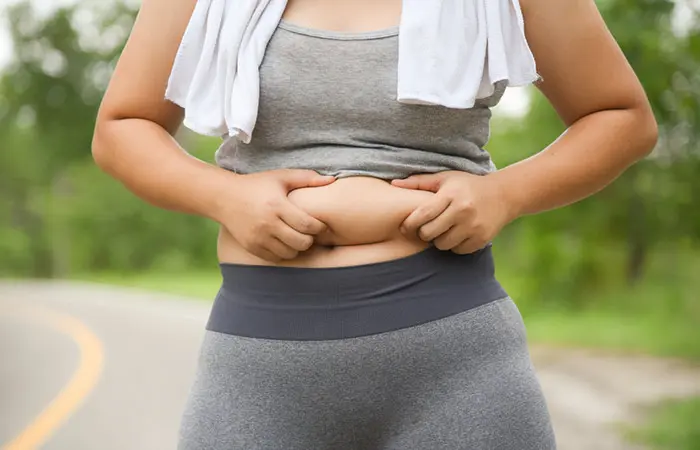
Belly fat or abdominal fat is a common problem these days. Moreover, abdominal fat is linked to diabetes, cardiovascular disease, and certain cancers (30). Research studies have confirmed that green tea catechins help reduce belly fat (31), (32).
Green tea also helps reduce waist circumference in the elderly with metabolic syndrome (33). Regular consumption of green tea also showed more reduction in visceral fati Fat deposits around the abdominal organs, including the stomach, liver, and intestines, which can elevate diabetes and heart attack risk. than overall body weight in another study (34).
Green tea extract is high in catechins. Taking green tea extract helps reduce abdominal fat, overall body weight, LDL cholesterol, and high blood pressure (35). You may also consume matcha tea for weight loss. It is a more powerful form of green tea and is said to have a higher concentration of antioxidants and nutrients.
Bottom Line – Regular consumption of green tea helps reduce belly fat and improve waist to hip ratio.
7. Green Tea Regulates Obesity Genes
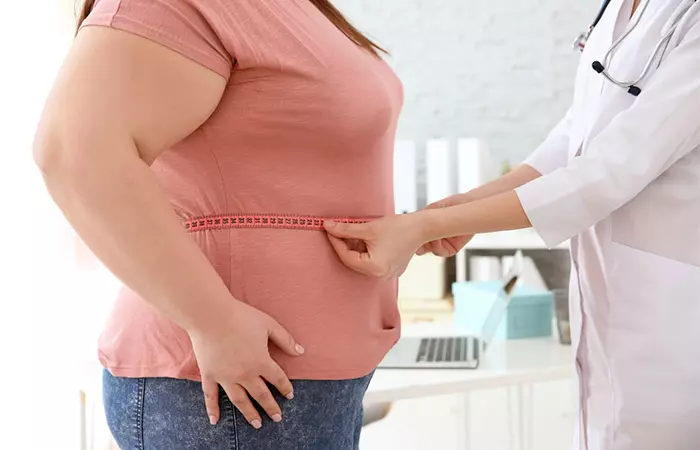
Interestingly, scientists found that green tea could regulate obesity-related genes (35). Researchers also found that green tea extract induced browning of white adipose tissue. This, in turn, helped reduce obesity (36).
Green tea extract also inhibits the expression of proteins involved in inflammation by improving gut barrier function (37). In another study, green tea EGCG decreased the expression of genes that cause fat deposition (38).
However, you must keep in mind that most of these studies are conducted on animal models. More research on human subjects is required to know the exact molecular mechanism of green tea’s weight loss properties.
Bottom Line – Green tea EGCG and green tea extract may inhibit the adipogenic and inflammatory genes and decrease body weight.
8. Green Tea Improves Exercise Performance
Exercising regularly is very important for healthy and sustainable weight loss. Many people are unable to workout for a long duration as they lack strength and stamina. Having a cup of green tea before working out may solve that.
Green tea extract (GTE) helps improve muscle endurance capacity (39). Supplementation of 500 mg/dar green tea extract for 15 days showed improved exercise performance and muscle recovery (40).
A study showed that green tea catechins (GTC) improved sports performance and increased fat oxidation by 17% and total energy expenditure (41).
Bottom Line – Green tea or green tea extract may help improve exercise performance, increase fat oxidation, and improve the rate of muscle recovery.
 Trivia
Trivia9. Green Tea Caffeine Helps Maintain Weight Loss
To lose weight is one thing; to maintain it is another. Maintaining weight loss is tougher than losing weight. But a few studies prove that green tea can help in maintaining weight loss as well.
Consuming green tea-caffeine mixture for 3 months helped improve weight loss maintenance through fat oxidation and increased thermogenesis in two studies (42), (16). More research on this is required, but the data looks promising.
Bottom Line – Continuing to drink green tea after weight loss prevents weight regain.
These are 9 ways green tea helps in weight loss. Now the question is, how to incorporate green tea into your diet? Check out the following infographic. Take a screenshot and use it for 7 days. You will see guaranteed results if you adhere to the plan.
Scroll down to the next section for the nutritional profile of green tea.
Key Takeaways
- Green tea includes catechins, a type of polyphenol that lowers belly fat and enhances waist to hip ratio.
- It also contains caffeine which boosts fat loss through exercise, lowers BMI and fat mass while also increasing energy expenditure.
- Green tea may aid in appetite control and satiety enhancement.
- It is advisable to drink 2-3 cups of green tea each day for best results.
Green Tea Nutrition
A cup (245 g) of regular brewed green tea contains several key nutrients (7). It primarily consists of water. It contains approximately 2.45 kilocalories. 0.049 mg of iron, 2.45 mg of magnesium, and 0.01 mg of copper. It also offers 19.6 mg of potassium, which is an essential mineral for various bodily functions.
Green tea also contains 0.451 mg of manganese, 2.45 mg of sodium, 0.025 mg of zinc, and 0.012 mg of vitamin B6. Additionally, it provides a dose of 29.4 mg of caffeine, which can provide a mild stimulant effect.
Check out the next section to learn how to include green tea in your diet for weight loss.
7-Day Green Tea Weight Loss Diet

This brings us to the next question. Which green tea is best for weight loss? Let’s find out below.
Which Type Of Green Tea Is Best For Weight Loss?

The best types of green tea for weight loss are oolong tea, matcha tea, and loose-leaf green tea. Black tea is more oxidized and hence does not contain many catechins. Flavored green teas are good, but they may contain preservatives. You may try the following combinations to make your green tea flavorful:
- Green tea and lemon
- Green tea and cinnamon
- Green tea and mint
- Green tea and honey or maple syrup
Note:
Do not add refined sugar to green tea if you are trying to lose weight. You may add a teaspoon of organic honey instead.
 Quick Tip
Quick TipCan I Drink Iced Green Tea For Weight Loss?
There are no studies so far that claim that iced green tea can help you lose weight. Hence, it is better to go for normal green tea from a trusted brand. If you are not sure which brand of green tea to buy, check out the next section.
Good Brands To Consider
When it comes to good green tea, it is best to look for the best and trusted tea brand. Here are a few brands that you may try:
Lipton, Waghbakri, Green Label, Tulsi, Tetley, Taj, Tazo, Bigelow, Stash, and Himalaya herbal teas. Here are a few more slimming teas you may check out before buying.
If your cup of green tea tastes grassy, check out this free guide on the easy ways to prepare green tea correctly.
You must be aware that nothing in excess is healthy for you. Drinking too many cups of green tea may cause side effects. That is why it is best to know the optimum dosage of green tea for weight loss. Know more about it below.
How Much Green Tea To Drink Per Day?
It is best to limit your green tea consumption to 2-3 cups per day. Also, do not exceed the 200 – 300 mg/ml caffeine intake. Consume decaffeinated green tea, but stick to the standard 2-3 cups of green tea per day.
Tip: To know how much green tea caffeine or EGCG you are consuming per cup, check the nutrition label.
What Is The Best Time To Drink Green Tea?
The best time for drinking green tea is right after waking up and before meals.
Green tea weight loss pills are also quite popular these days. Should you take them? What is the catch? Find out in the section below.
Are Green Tea Weight Loss Supplements Good For Weight Loss?
Green tea extract supplements have 10% more catechins, epigallocatechin gallate (EGCG). Hence, taking green tea supplements may show faster weight loss results.
However, taking them without consulting a doctor or taking too many of them may cause side effects. This high concentration of EGCG through green tea pills cause mitochondrial toxicityi A condition that involves the damage or rapid decline of mitochondria in the body's cells and may affect the brain, eyes, heart, etc. , leading to hepatotoxicityi A term used to describe liver injury caused by the ill effects of alcohol, herbal supplements, medications, or food additives. (43).
What about taking green tea after childbirth for weight loss? Find the answer below.
Can I Drink Green Tea After Childbirth Or During Breastfeeding?

Please consult your gynecologist first. However, we would suggest that you avoid being on any diet right after childbirth or while breastfeeding.
If you are still unsure of how to include green tea into your diet plan, check out the next section for help. Keep reading!
Practical Tips For Incorporating Green Tea Into Your Diet
Here are some practical tips to help you add green tea to your diet:
- Begin your morning with a cup of warm green tea to wake up and boost your metabolism.
- Enjoy a cup of green tea in the afternoon to combat energy slumps and improve focus.
- Create unique and refreshing beverages by adding green tea ice cubes to water, lemonade, or iced tea.
- Use green tea, instead of water, when blending fruits, vegetables, and yogurt to make a nutritious and delicious smoothie.
- Explore creative recipes that incorporate green tea into desserts like cakes, cookies, or ice cream.
Infographic: 5 Ways Green Tea Can Help With Weight Loss
Green tea is a low-calorie, antioxidant-rich beverage and a favorite among fitness enthusiasts for its weight loss benefits. If you want to shed some pounds, you can switch from your high-calorie, sugar-based drinks to a refreshing cup of green tea. But how does it help with weight loss? Check out the infographic below for more information!
Some thing wrong with infographic shortcode. please verify shortcode syntaxIf you have ever considered making lifestyle and diet changes for weight management, you must have considered drinking green tea for weight loss. While many follow this trend blindly, it’s important to critically evaluate green tea benefits to understand how it works and affects your body’s metabolism. Green tea is a low-calorie, natural drink rich in anti-inflammatory catechins that help to detox your system, reduce abdominal fat, lower blood sugar, and cholesterol levels, and boost your metabolism as well. If you don’t find its taste agreeable, you can add lemon, mint, ginger, cinnamon, or honey to prepare it as per your liking. Drinking green tea just after waking up or before meals would give you the most effective results. However, make sure not to overdo it and limit it to 1-2 cups per day to avoid any possible side effects.
Frequently Asked Questions
How much weight can I lose in a month with green tea?
You may be able to lose an average of a pound in a month by adding unsweetened green tea to your diet .
Can I drink green tea at night?
Yes, you may. However, green tea contains caffeine, so it is best avoided close to bedtime.
Can we drink green tea empty stomach?
Yes, you may drink green tea on an empty stomach. However, in some individuals green tea might cause discomfort when consumed on an empty stomach. It is recommended to avoid green tea on an empty stomach if you feel symptoms like nausea, stomach ache or a burning sensation in the throat.
Should you drink green tea hot or cold?
You may drink green tea both hot and cold. It depends on your taste and preference. However, packaged iced green tea may contain sweeteners and preservatives, which are not ideal if you want to lose weight through green tea consumption.
Illustration: Green Tea For Weight Loss: How Does It Help?
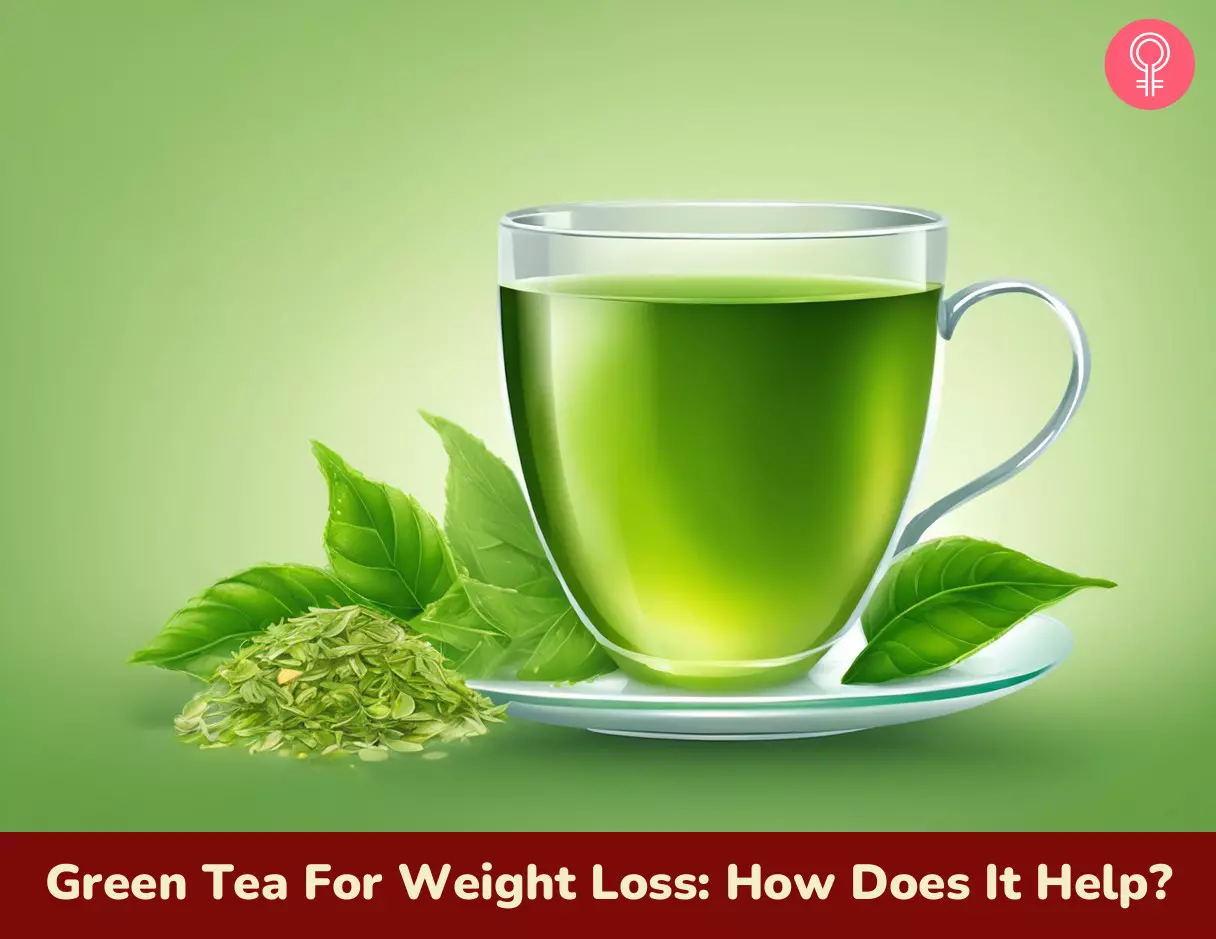
Image: Stable Diffusion/StyleCraze Design Team
References
Articles on StyleCraze are backed by verified information from peer-reviewed and academic research papers, reputed organizations, research institutions, and medical associations to ensure accuracy and relevance. Read our editorial policy to learn more.
- Green tea catechins: defensive role in cardiovascular disorders, Chinese Journal of Natural Medicines, ScienceDirect.
https://www.sciencedirect.com/science/article/pii/S1875536413600515 - Green tea catechins and blood pressure: a systematic review and meta-analysis of randomised controlled trials, European Journal of Nutrition, SpringerLink.
https://link.springer.com/article/10.1007/s00394-014-0720-1 - Green tea catechins and their metabolites in human skin before and after exposure to ultraviolet radiation, The Journal of Nutritional Biochemistry, ScienceDirect. https://www.sciencedirect.com/science/article/pii/S0955286315002363
- Abstract CT111: Green tea extract supplementation, estrogen metabolism and breast cancer risk in postmenopausal women at high risk of breast cancer, American Association for Cancer Research. https://cancerres.aacrjournals.org/content/75/15_Supplement/CT111.short
- The antimicrobial possibilities of green tea, Frontiers in Microbiology.
https://www.frontiersin.org/journals/microbiology/articles/10.3389/fmicb.2014.00434/full - Potential benefits of green tea polyphenol EGCG in the prevention and treatment of vascular inflammation in rheumatoid arthritis, Life Sciences, ScienceDirect.
https://www.sciencedirect.com/science/article/abs/pii/S0024320513003937?np=y - Beverages, tea, green, brewed, regular, FoodData Central, U.S. Department Of Agriculture.
https://fdc.nal.usda.gov/food-details/171917/nutrients - Green Tea Catechins: Their Use in Treating and Preventing Infectious Diseases, Biomed Research International, US National Library of Medicine, National Institutes of Health.
https://www.ncbi.nlm.nih.gov/pmc/articles/PMC6076941/ - Total Phenol, Catechin, and Caffeine Contents of Teas Commonly Consumed in the United Kingdom, Journal of Agricultural and Food Chemistry.
https://pubs.acs.org/doi/full/10.1021/jf010153l?src=recsys - Green tea catechin, epigallocatechin-3-gallate (EGCG): mechanisms, perspectives and clinical applications
https://www.ncbi.nlm.nih.gov/pmc/articles/PMC4082721/ - Ingestion of a tea rich in catechins leads to a reduction in body fat and malondialdehyde-modified LDL in men. The American Journal of Clinical Nutrition, US National Library of Medicine, National Institutes of Health.
https://pubmed.ncbi.nlm.nih.gov/15640470/ - Anti-obesity Effects of Tea Catechins in Humans, Journal of Oleo Science.
https://www.jstage.jst.go.jp/article/jos/50/7/50_7_599/_article - Beneficial Effects of Tea and the Green Tea Catechin Epigallocatechin-3-gallate on Obesity, Molecules, US National Library of Medicine, National Institutes of Health.
https://www.ncbi.nlm.nih.gov/pmc/articles/PMC6274011/ - The effect of caffeine on energy balance. Journal of Basic and Clinical Physiology and Pharmacology, US National Library of Medicine, National Institutes of Health.
https://pubmed.ncbi.nlm.nih.gov/27824614/ - Body weight loss and weight maintenance in relation to habitual caffeine intake and green tea supplementation. Obesity Research, US National Library of Medicine, National Institutes of Health.
https://pubmed.ncbi.nlm.nih.gov/16076989/ - Green tea catechins, caffeine and body-weight regulation. Physiology & Behavior, US National Library of Medicine, National Institutes of Health.
https://pubmed.ncbi.nlm.nih.gov/20156466/ - The effects of caffeine intake on weight loss: a systematic review and dos-response meta-analysis of randomized controlled trials. Critical Reviews in Food Science and Nutrition, US National Library of Medicine, National Institutes of Health.
https://pubmed.ncbi.nlm.nih.gov/30335479/ - The effects of caffeine and exercise on body weight, fat-pad weight, and fat-cell size. Medicine and Science in Sports and Exercise, US National Library of Medicine, National Institutes of Health.
https://pubmed.ncbi.nlm.nih.gov/7132651/ - The potential role of antioxidants in metabolic syndrome. Current Pharmaceutical Design, US National Library of Medicine, National Institutes of Health.
https://pubmed.ncbi.nlm.nih.gov/26648468/ - How Effective Are Antioxidant Supplements in Obesity and Diabetes? Medical Principles and Practice, US National Library of Medicine, National Institutes of Health.
https://www.ncbi.nlm.nih.gov/pmc/articles/PMC5588240/ - Oolong Tea Increases Metabolic Rate and Fat Oxidation in Men, The Journal of Nutrition, Oxford Academic.
https://academic.oup.com/jn/article/131/11/2848/4686734 - Effectiveness of green tea on weight reduction in obese Thais: A randomized, controlled trial. Physiology & Behavior, US National Library of Medicine, National Institutes of Health.
https://pubmed.ncbi.nlm.nih.gov/18006026/ - The anti-obesity effects of green tea in human intervention and basic molecular studies. European Journal of Clinical Nutrition, US National Library of Medicine, National Institutes of Health.
https://pubmed.ncbi.nlm.nih.gov/25074392/ - Green Tea, Intermittent Sprinting Exercise, and Fat Oxidation, Nutrients, US National Library of Medicine, National Institutes of Health.
https://www.ncbi.nlm.nih.gov/pmc/articles/PMC4517022/ - Matcha Green Tea Drinks Enhance Fat Oxidation During Brisk Walking in Females. International Journal of Sport Nutrition and Exercise Metabolism, US National Library of Medicine, National Institutes of Health.
https://pubmed.ncbi.nlm.nih.gov/29345213/ - Antiobesity effects of green tea catechins: a mechanistic review. The Journal of Nutritional Biochemistry, US National Library of Medicine, National Institutes of Health.
https://pubmed.ncbi.nlm.nih.gov/21115335/ - Does green tea affect postprandial glucose, insulin and satiety in healthy subjects: a randomized controlled trial. Nutrition Journal, US National Library of Medicine, National Institutes of Health.
https://pubmed.ncbi.nlm.nih.gov/21118565/ - Beverages containing soluble fiber, caffeine, and green tea catechins suppress hunger and lead to less energy consumption at the next meal. Appetite, US National Library of Medicine, National Institutes of Health.
https://pubmed.ncbi.nlm.nih.gov/22922604/ - Is Coffee and Green Tea Consumption Related to Serum Levels of Adiponectin and Leptin? International Journal of Preventive Medicine, US National Library of Medicine, National Institutes of Health.
https://www.ncbi.nlm.nih.gov/pmc/articles/PMC6298130/ - The clinical importance of visceral adiposity: a critical review of methods for visceral adipose tissue analysis, The British Journal of Radiology, US National Library of Medicine, National Institutes of Health.
https://www.ncbi.nlm.nih.gov/pmc/articles/PMC3473928/ - Effects of catechin enriched green tea on body composition. Obesity, US National Library of Medicine, National Institutes of Health.
https://pubmed.ncbi.nlm.nih.gov/19680234/ - Green tea catechin consumption enhances exercise-induced abdominal fat loss in overweight and obese adults. The Journal of Nutrition, US National Library of Medicine, National Institutes of Health.
https://pubmed.ncbi.nlm.nih.gov/19074207/ - Effect of green tea (Camellia sinensis) consumption on the components of metabolic syndrome in elderly, The Journal of Nutrition, Health & Aging, SpringerLink.
https://link.springer.com/article/10.1007/s12603-012-0081-5 - Effects of chronic consumption of green tea on weight and body fat distribution of Wistar rats evaluated by computed tomography. Acta cirúrgica brasileira, US National Library of Medicine, National Institutes of Health.
https://pubmed.ncbi.nlm.nih.gov/28591363/ - A green tea extract high in catechins reduces body fat and cardiovascular risks in humans. Obesity, US National Library of Medicine, National Institutes of Health.
https://pubmed.ncbi.nlm.nih.gov/17557985/ - Green tea extract induces genes related to browning of white adipose tissue and limits weight-gain in high energy diet-fed rat. Food & Nutrition Research, US National Library of Medicine, National Institutes of Health.
https://pubmed.ncbi.nlm.nih.gov/28804438/ - Green tea extract prevents obesity in male mice by alleviating gut dysbiosis in association with improved intestinal barrier function that limits endotoxin translocation and adipose inflammation. The Journal of Nutritional Biochemistry, US National Library of Medicine, National Institutes of Health.
https://pubmed.ncbi.nlm.nih.gov/30856467/ - Green tea (-)-epigallocatechin-3-gallate reduces body weight with regulation of multiple genes expression in adipose tissue of diet-induced obese mice. Annals of Nutrition & Metabolism, US National Library of Medicine, National Institutes of Health.
https://pubmed.ncbi.nlm.nih.gov/19390166/ - Green tea extract improves endurance capacity and increases muscle lipid oxidation in mice. American Journal of Physiology. Regulatory, Integrative and Comparative Physiology, US National Library of Medicine, National Institutes of Health.
https://pubmed.ncbi.nlm.nih.gov/15563575/ - Green Tea Extract Preserves Neuromuscular Activation and Muscle Damage Markers in Athletes Under Cumulative Fatigue, Frontiers in Physiology, US National Library of Medicine, National Institutes of Health.
https://www.ncbi.nlm.nih.gov/pmc/articles/PMC6107802/ - Green Tea Catechins and Sport Performance, Antioxidants in Sports Nutrition, US National Library of Medicine, National Institutes of Health.
https://www.ncbi.nlm.nih.gov/books/NBK299060/ - Green tea catechin plus caffeine supplementation to a high-protein diet has no additional effect on body weight maintenance after weight loss. The American Journal of Cinical Nutrition, US National Library of Medicine, National Institutes of Health.
https://pubmed.ncbi.nlm.nih.gov/19176733/ - GREEN TEA, National Institutes of Health.
https://www.ncbi.nlm.nih.gov/books/n/livertox
Read full bio of Merlin Annie Raj
Read full bio of Ravi Teja Tadimalla
Read full bio of Sindhu Koganti






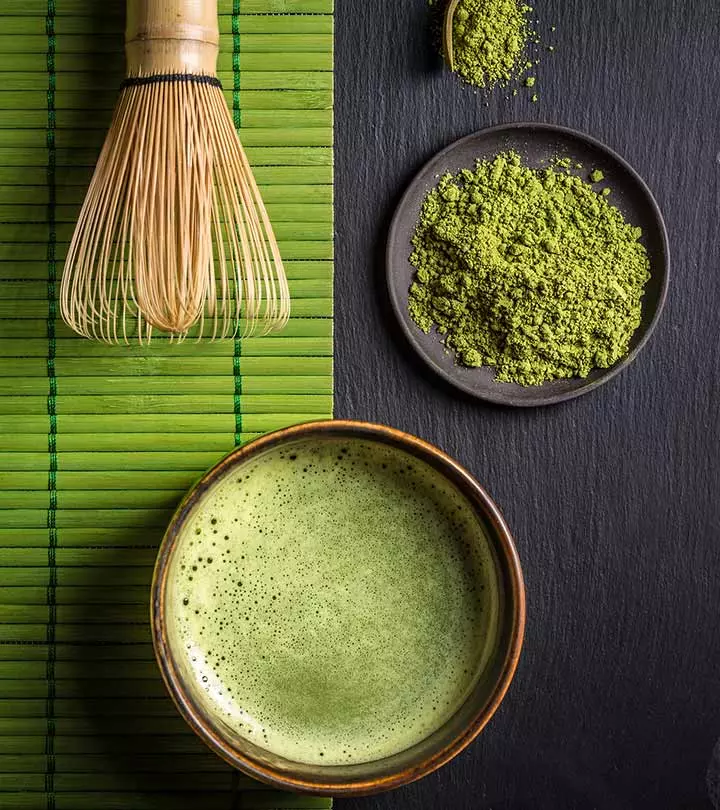



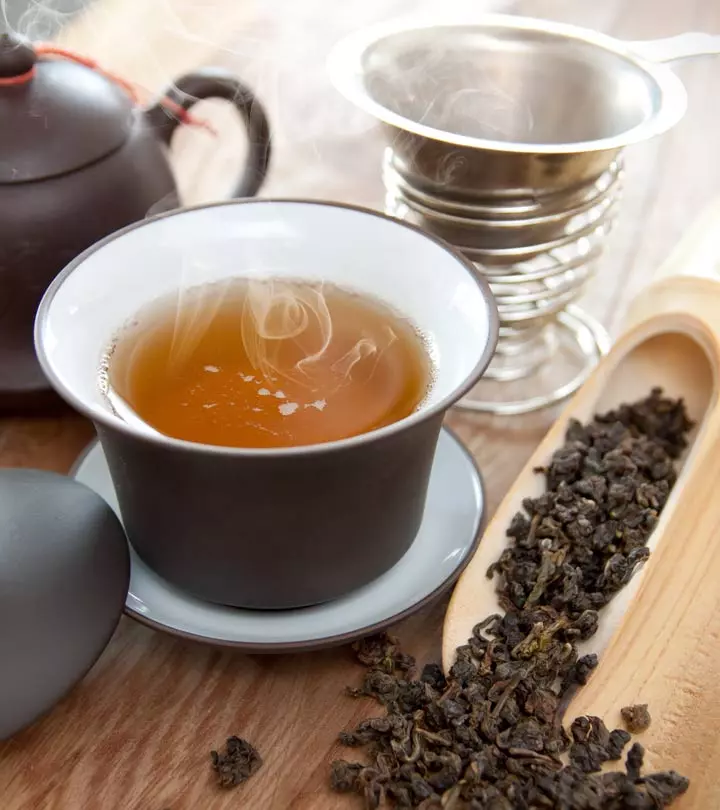
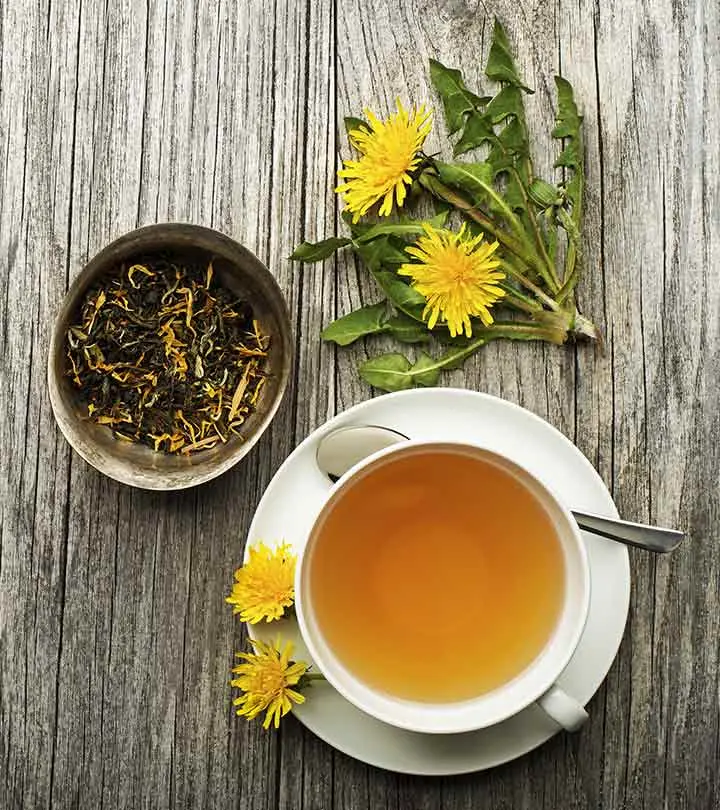



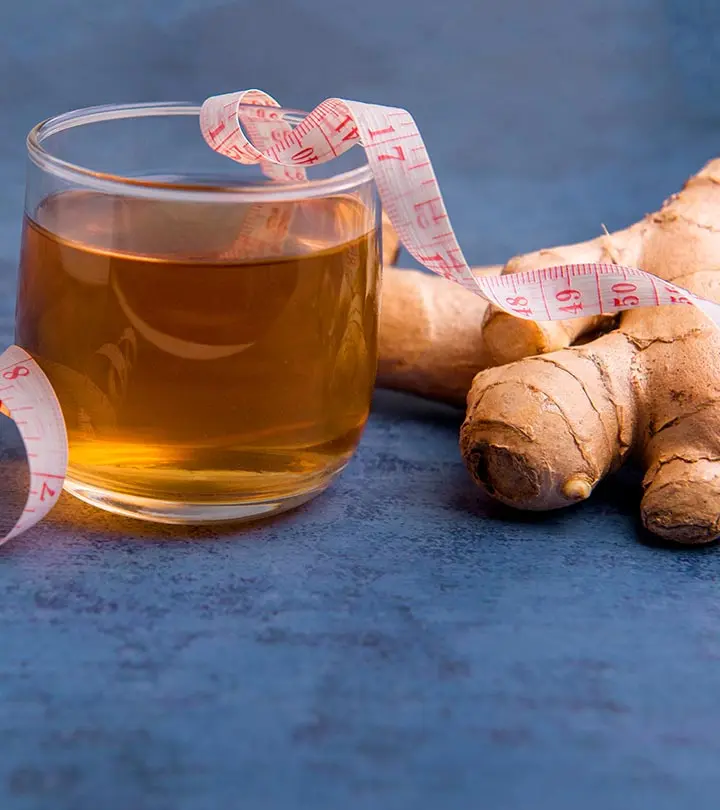




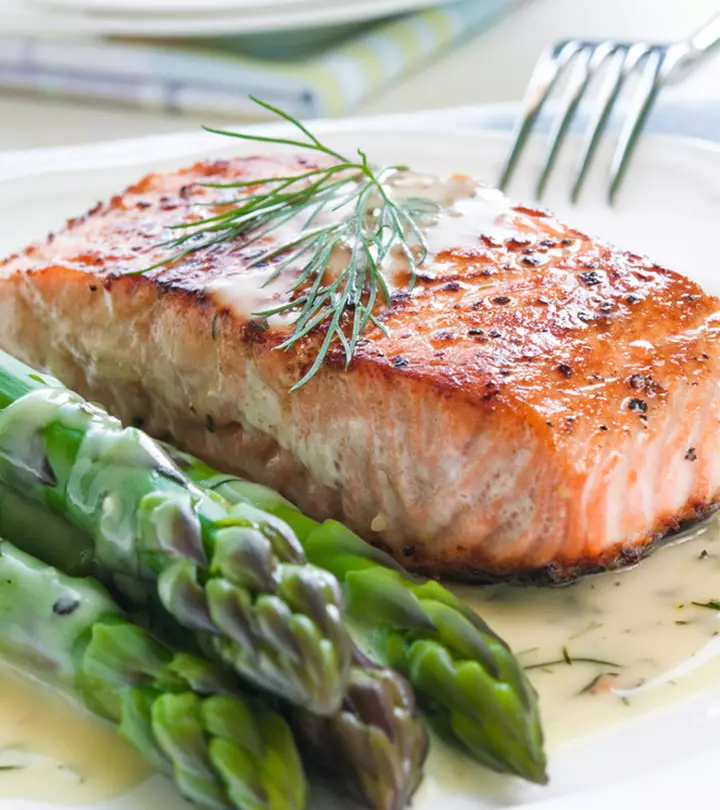
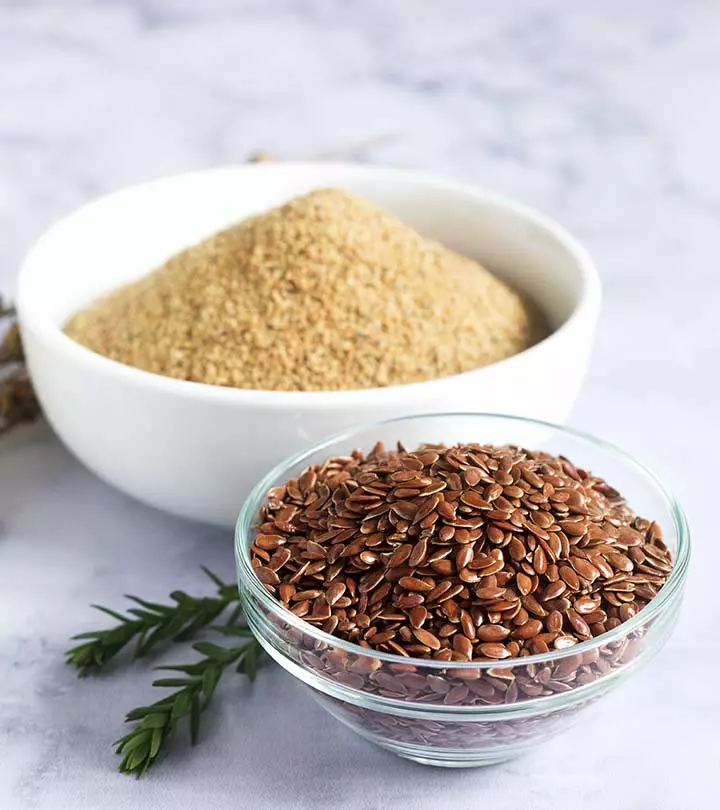



Community Experiences
Join the conversation and become a part of our empowering community! Share your stories, experiences, and insights to connect with other beauty, lifestyle, and health enthusiasts.